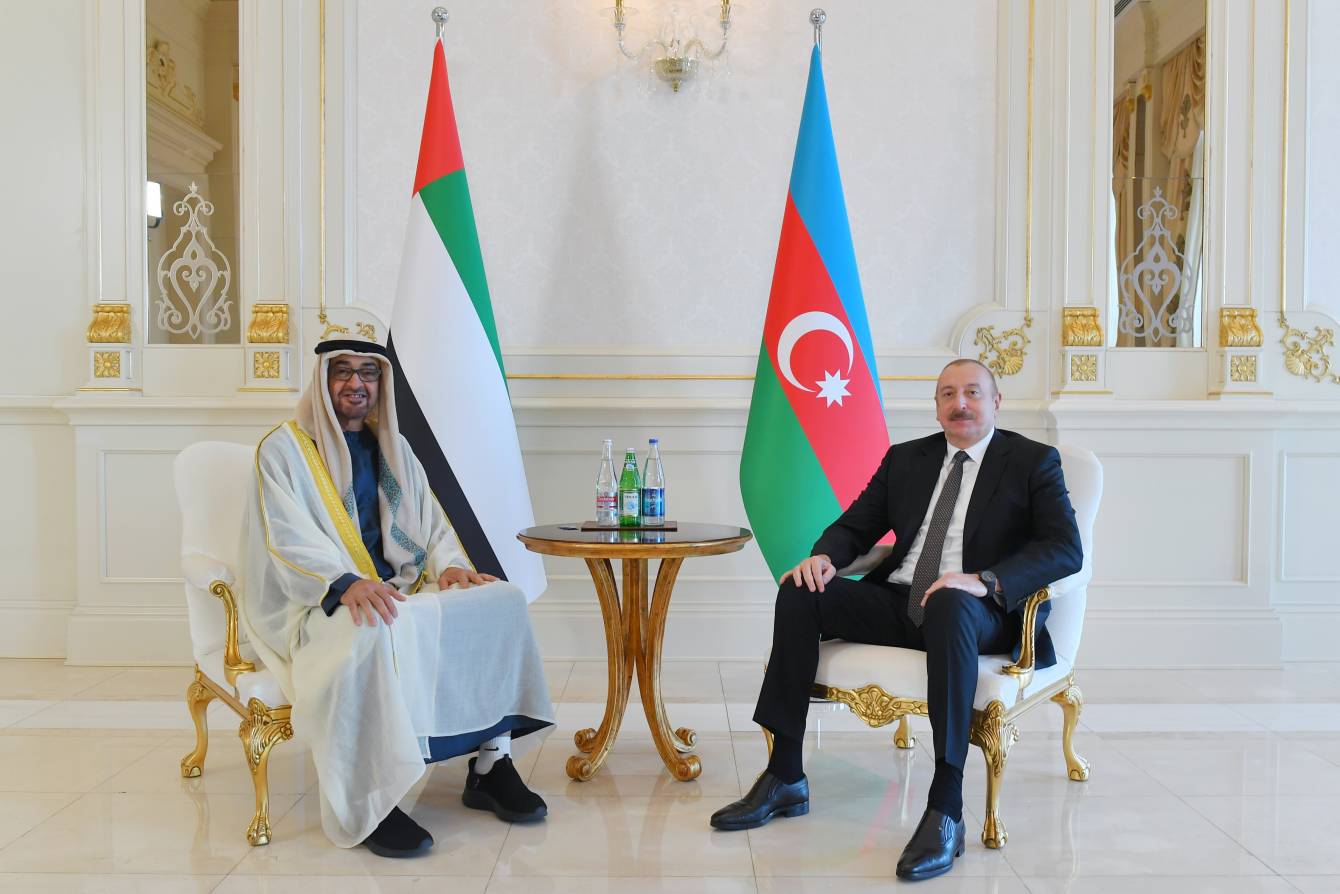Azerbaijan and the United Arab Emirates (UAE) signed a series of documents on Tuesday to accelerate their cooperation in renewable energy.
Documents were exchanged at the meeting between UAE President Sheikh Mohamed bin Zayed Al Nahyan and Azerbaijani President Ilham Aliyev in Baku. Sheikh Nahyan’s visit, spanning two days, marked the inaugural presidential trip from the Gulf nation to the South Caucasus.
“Our cooperation is multifaceted, spanning many areas. In the recent past, significant strides have been taken in the energy sector, particularly in the field of green energy,” President Aliyev said during the meeting on Tuesday. He added that Sheikh Nahyan’s visit would help explore new opportunities for expanding the partnership.
During the meeting, four agreements were signed to redefine the primary objectives of the extensive collaboration on green energy between the two parties, outlining mutual investment projects for electricity transmission. The documents’ events calendar emphasizes joint exploration of cooperation and investment opportunities in rooftop solar projects, green hydrogen, green ammonia, synthetic methane, sustainable aviation fuel production, and the export of green energy. Furthermore, it encompasses 2 GW solar and 2 GW onshore wind projects, along with 6 GW offshore wind energy. The UAE is set to finance the construction of two solar and one wind power plants in Azerbaijan between 2024 and 2027. These new power plants will unlock access to 1 GW of alternative energy potential for stakeholders.
UAE enterprises are actively engaged in the alternative energy industry in Azerbaijan. In October 2023, Masdar, a prominent developer and operator of large-scale renewable energy projects in the UAE, inaugurated a $200 million, 230 MW photovoltaic station in the Garadagh district, located 23 kilometers southwest of Baku. The Garadagh Solar Power Plant is projected to generate a total energy output of approximately half a billion kilowatt-hours per year. This capacity is ample to supply electricity to over 110,000 households and contribute to an annual reduction of 200,000 tons in greenhouse gas emissions.
The collaborative effort between the UAE and Azerbaijan to leverage the abundant renewable energy resources in multi-million dollar projects resonates with Baku’s commitment to contributing to the global fight against climate change. This commitment is particularly evident as Baku prepares to host the 29th Conference of the Parties to the UN Framework Convention on Climate Change (UNFCC), also known as COP29.
Azerbaijan secured its hosting of COP29 during COP28’s plenary session on December 11, 2023, with collective support from other Eastern European countries. President Aliyev, on December 25, 2023, declared 2024 as the “Green World Solidarity Year” in Azerbaijan. The event is set for November this year, anticipating around 80,000 foreign guests for the two-week global climate action gathering.
COP, the annual United Nations meeting, assesses global progress in addressing climate change within UNFCCC guidelines. The primary goal is to limit climate change by achieving “net zero” greenhouse gas emissions, especially from fossil fuels.
Azerbaijan, known for its oil and gas exports, has implemented measures to address climate change, adopting laws, rules, and programs for transitioning to green energy and decarbonization. The country possesses extensive renewable energy resources, with a technical potential estimated at 135 gigawatts on land and 157 gigawatts at sea. The economic potential of green energy, according to the Energy Ministry, includes 27 gigawatts, comprising 3 gigawatts of wind energy, 23 gigawatts of solar energy, 380 megawatts of bioenergy, and 520 megawatts of mountain river potential.
Azerbaijan actively participates in global and regional initiatives to tackle climate change. In addition to its commitments under the Kyoto and Paris Protocols, the country launched the “EU4Energy” program in 2016, focusing on promoting sustainable energy policies in collaboration with the Eastern Partnership countries of the European Union. Furthermore, in February 2021, Azerbaijan introduced the “Azerbaijan 2030: National Priorities for Socio-Economic Development” program, emphasizing the fifth priority for a transition to “green development” and contributing to a cleaner environment. To expedite the shift to clean energy, the country adopted the “On the use of renewable energy sources in the production of electricity” law in May 2021, expanding the action plan.







 President Ilham Aliyev shed light on the evolving contours of the peace process with Armenia during an international conference in Baku this week. ...
President Ilham Aliyev shed light on the evolving contours of the peace process with Armenia during an international conference in Baku this week. ...
 Azerbaijan and Armenia started the process of demarcation of their border on Tuesday, with the installation of the first border markers based on ge...
Azerbaijan and Armenia started the process of demarcation of their border on Tuesday, with the installation of the first border markers based on ge...
 Iranian President Ebrahim Raisi expressed Tehran’s readiness to participate in significant development projects in Sri Lanka during the inauguratio...
Iranian President Ebrahim Raisi expressed Tehran’s readiness to participate in significant development projects in Sri Lanka during the inauguratio...
 As the conflict between Ukraine and Russia escalates, the strategic importance of Kharkiv, Ukraine's second-largest city, has come sharply into focus.
As the conflict between Ukraine and Russia escalates, the strategic importance of Kharkiv, Ukraine's second-largest city, has come sharply into focus.
 Iran and Pakistan have signed eight cooperation documents in various fields, and agreed to strengthen ties to fight terrorism in the region.
Iran and Pakistan have signed eight cooperation documents in various fields, and agreed to strengthen ties to fight terrorism in the region.



